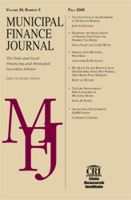The Great Recession’s Impact on New York City’s Budget
Author: Lawrence J Miller.; Daniel L. Smith.
Source: Volume 32, Number 01, Spring 2011 , pp.89-113(25)

< previous article |next article > |return to table of contents
Abstract:
Strong property tax growth and proactive policies—including having a substantial surplus of $5.3 billion (9% of revenues) at the beginning of the Great Recession—offset a severe contraction in income tax receipts and protected the city’s budget so that it never contracted in absolute terms during or immediately following the Great Recession. Policymakers increased property and sales tax rates, utilized fund balances, cut agency budgets repeatedly, and reappropriated retiree health benefits in response to the fiscal challenges brought about by the Great Recession. Whether one attributes the city’s position to compliance with a strong, state-mandated, balanced-budget rule or adept leadership, New York City certainly appears to be dealing effectively with the Great Recession’s impact on its budget. However, city leaders have asked lower income residents to bear a substantial portion of the burden by favoring more regressive tax policies and by cutting the social service agency’s budget substantially. With forecast budget gaps of $3 billion and $4 billion in FY2012 and FY2013, the long-term impact of the Great Recession on New York City’s budget remains an open question.Keywords: Demographics; politics; balanced budget rule; tax policy; revenue generation; revenue forecasting
Affiliations:
1: Rutgers University School of Public Affairs and Administration; 2: New York University Wagner Graduate School of Public Service.